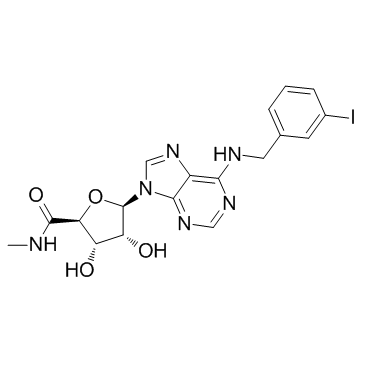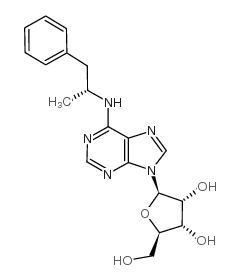Rapid stimulation of presynaptic serotonin transport by A(3) adenosine receptors.
Chong-Bin Zhu, Jennifer A Steiner, Jaclyn L Munn, Lynette C Daws, William A Hewlett, Randy D Blakely
Index: J. Pharmacol. Exp. Ther. 322(1) , 332-40, (2007)
Full Text: HTML
Abstract
The inactivation of synaptic serotonin (5-hydroxytryptamine, 5-HT) is largely established through the actions of the presynaptic, antidepressant-sensitive 5-HT transporter (SERT, SLC6A4). Recent studies have demonstrated post-translational regulation of SERT mediated by multiple Ser/Thr kinases, including protein kinases C and G (PKC and PKG) and p38 mitogen-activated protein kinase (MAPK), as well as the Ser/Thr phosphatase PP2A. Less well studied are specific surface receptors that target these signaling pathways to control SERT surface expression and/or catalytic rates. Using rat basophilic leukemia 2H3 cell line (RBL-2H3), we previously established that activation of A(3) adenosine receptors (A(3)AR) stimulates SERT activity via both PKG and p38 MAPK (Zhu et al., 2004a). Whether A(3)ARs regulate SERT in the central nervous system (CNS) is unknown. Here we report that the A(3)AR agonist N(6)-(3-iodobenzyl)-N-methyl-5'carbamoyladenosine (IB-MECA) rapidly (10 min) and selectively stimulates 5-HT transport in mouse midbrain, hippocampal, and cortical synaptosomes. IB-MECA-induced stimulation of 5-HT uptake is blocked by the selective A(3)AR antagonist 3-ethyl-5-benzyl-2-methyl-phenylethynyl-6-phenyl-1,4(+/-)dihydropyridine-3,5-dicarboxylate (MRS1191) and is absent from synaptosomes prepared from A(3)AR knockout mice. Kinetic analyses demonstrate that IB-MECA induces an increase of 5-HT transport V(max) with no significant change in K(m). As in RBL-2H3 cells, IB-MECA stimulation of synaptosomal 5-HT uptake can be blocked by preincubation with PKG antagonists N-[2-(methylamino)ethy]-5-isoquinoline-sulfonamide (H8) and DT-2 (YGRKKRRQRRRPPLRK(5)H), as well as by the p38 MAPK inhibitor SB203580 [4-(4-fluorophenyl)-2-(4-methylsulfinylphenyl)-5-(4-pyridyl)-1H-imidazole]. Chronoamperometry studies in the anesthetized rat hippocampus support a role for A(3)ARs in SERT regulation in vivo. Together, these results identify a novel, region-specific action of CNS A(3)ARs in the modulation of SERT-mediated 5-HT transport that may be relevant for the etiology and/or therapy of 5-HT-linked brain disorders.
Related Compounds
| Structure | Name/CAS No. | Molecular Formula | Articles |
|---|---|---|---|
 |
IB-MECA
CAS:152918-18-8 |
C18H19IN6O4 | |
 |
(R)?-?PIA
CAS:38594-96-6 |
C19H23N5O4 |
|
Equilibrium and kinetic selectivity profiling on the human a...
2016-04-01 [Biochem. Pharmacol. 105 , 34-41, (2016)] |
|
Activation of A1, A2A, or A3 adenosine receptors attenuates ...
2010-08-01 [J. Thorac. Cardiovasc. Surg. 140(2) , 440-6, (2010)] |
|
Activation of adenosine low-affinity A3 receptors inhibits t...
2009-12-01 [Am. J. Physiol. Gastrointest. Liver Physiol. 297(6) , G1147-62, (2009)] |
|
A role for central A3-adenosine receptors. Mediation of beha...
1993-12-20 [FEBS Lett. 336 , 57-60, (1993)] |
|
The effects of adenosine A3 receptor stimulation on seizures...
1995-02-24 [Eur. J. Pharmacol. 275 , 23-29, (1995)] |